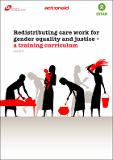| dc.description.abstract | People contribute to the economy through their work in many different ways; such as small-scale trading in the local market or as casual labourers in commercial farms. Others are factory workers, miners, teachers, and domestic workers etc. Through their work women and men contribute to the productive economy by producing goods and services that people use every day. It is this work that is counted and measured by governments. Yet, the work of social reproduction – which refers to the activities needed to ensure the
reproduction of the labour force – is not counted. Social reproduction includes activities such as child bearing, rearing, and caring for household members (such as children, the elderly and workers). These tasks are completed mostly by women and girls and support all the activities in the productive economy. Unpaid care work is a component of social reproduction relating specifically to all the activities that go towards caring for people within a household or community. This work is not paid, requires time and energy, and is done out of social obligation and/or love and affection. However, this is an essential component of the economy – care work sustains all other human activity. We know that care is critical in our lives – it has a widespread, long term, positive impact on well-being and development. However, prevalent gender norms – the ways in which women and men are expected to behave – and class inequalities lead to an imbalance in care work
with women and girls living in poverty taking on a far greater share of unpaid and paid care work under difficult working conditions. | en |


